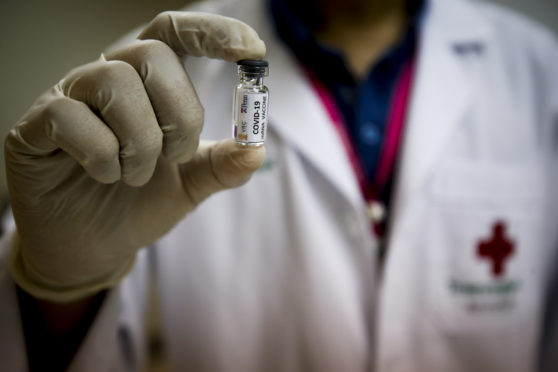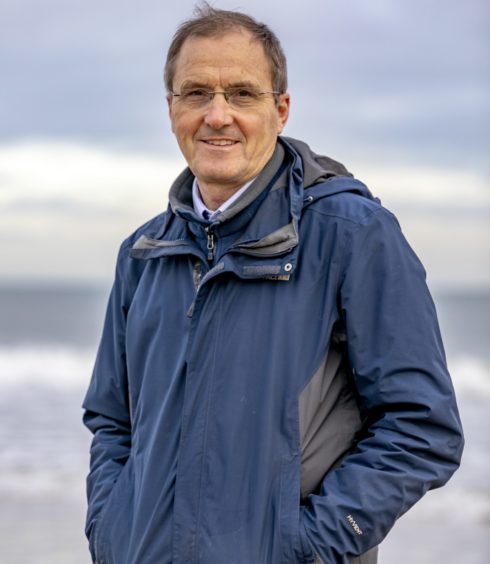
A coronavirus vaccine may never be found despite 200 being tested around the world, a government scientific adviser has warned.
Instead, social distancing and contact tracing may remain in place for years to prevent the spread of the disease, according to Sir Ian Boyd, a member of the UK advisory group for emergencies.
Governments and companies are pouring millions of pounds into vaccine programmes in the hope of saving lives and securing a path out of the Covid-19 lockdown.
One drug manufacturer has even suggested a vaccine could be ready in Britain by September, but Sir Ian warned a successful vaccine that provides long-term immunity against coronavirus could take years or may even never be found.
He told The Sunday Post: “Viral diseases that are distributed like this are extraordinary difficult to eradicate. In the history of medicine, we have only ever eradicated one viral disease, and that’s smallpox.
“We’re quite close to eradicating polio, but very sadly it has gone into reverse over the past few years. On a global scale, I think the prospects of eradication is close to zero.
“I think on a national scale it’s maybe possible, but it would be extraordinary difficult to maintain it at zero because we tend to travel and bring infection in. I think the chances of it being eradicated are extremely small.”
Sir Ian, professor in biology at the University of St Andrews, was chief scientific adviser at the Department for Environment, Food and Rural Affairs from 2012 until 2019. He is a member of the Scientific Advisory Group for Emergencies (Sage), the group of scientists that has been advising UK Government ministers on coronavirus.
He said: “There are about 200 different vaccine solutions being investigated worldwide, but around a dozen are front-runners.
“Vaccines need to stimulate the immune system of people to recognise the virus. But viruses develop mechanisms to mask themselves against the immune system. HIV is very good at this.
“This means they can avoid the effects of vaccines. Finding a vaccine that gets around all these virus strategies to cloak themselves and which does this consistently and which stimulates long-term immunity – ie where people continue to produce antibodies for months or years – is very difficult. Every attempt to produce a vaccine is, to some extent, a shot in the dark.”
Sir Ian, who was involved in advising the UK Government after the Novichok poisonings by Russian agents in Salisbury in 2018, warned that, until a coronavirus vaccine is found,the public will have to continue to observe social distancing measures.
He said: “We only have three methods really to control the effects of this disease. One is to protect people through vaccination. Another is to intervene with therapies when people get the disease to prevent the worst effects of it.
“The third one is reduce the number of contacts between people in order to reduce the transmission of the disease, and that can only happen through behavioral modification.
“Until we get therapies and vaccine up and running, behavioural modification is the only tool we have available to us.
“It may be years before we’re able to take that away completely because it depends on us getting those other tools in place, and we have no idea how long that is going to take us.
“It’s possible, of course, we might come up with the perfect vaccine that everybody can then have, but I think the chances of that in the next 12 to 18 months are relatively small. I think the chances in the next five years are moderate. I think the chances in the next 10 years are reasonably good.
“But, with many of these diseases, even with major financial investment, we have struggled to develop appropriate vaccines. I hope we will find a vaccine but we have to manage expectations.”
Under the new test-and-trace scheme launched on Thursday, those who have been in contact with people who have tested positive will be told to isolate for 14 days, even if they are not sick.
Sir Ian said: “Contact tracing is the key way to stop the epidemic flaring up again. It will last for as long as there is a problem, so I think we will find we are contact tracing many years down the road.”
The UK Government has faced criticism for abandoning contact tracing in March before resuming the programme last week.
But Sir Ian said: “Most countries were unable to sustain a contact tracing system in the face of the rapidly moving disease they had.
“Contact tracing really only works when the disease prevalence in the population is at quite a low level. Once it gets above a certain level, then it becomes almost pointless.
“We’re only just introducing contact tracing now because the prevalence is going down to the level where it becomes a practical proposition.”
Sir Ian urged people to follow the contract tracing rules. He said: “The incidence of the disease is declining reasonably quickly and the number of people dying from it is declining even faster, which is welcome news.
“All the indicators are that we’ve got this under control at the moment but we must absolutely not take our foot off the accelerator.
“It is a matter of always bearing down on it because this virus is here for the long term.
“It’s going to be extraordinary difficult to eradicate it. It will always be waiting around to flare up again and we will always have to be on our guard until we get other forms of intervention that might be less of a daily chore.”

Enjoy the convenience of having The Sunday Post delivered as a digital ePaper straight to your smartphone, tablet or computer.
Subscribe for only £5.49 a month and enjoy all the benefits of the printed paper as a digital replica.
Subscribe